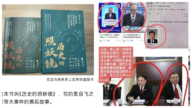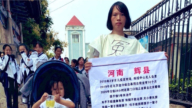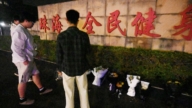【新唐人2013年01月18日訊】「中國建設銀行」聯合「波士頓諮詢公司」發佈了《2012年中國財富報告》。據報告顯示,在中國,北京的富人最多,而不是經濟最強大的江浙、廣東等省份。學者指出,這是一種極度不正常的現象,折射了中國經濟的邪路。
中國財富報告調研的範圍是從全國30個省、市、自治區中,隨機抽取金融淨資產達到600萬元人民幣以上的1900多名高淨值客戶,並對他們的地域分佈進行了詳細的分析。被稱為中國的「富人地圖」。
報告顯示,截至2012年底,可投資資產600萬元人民幣以上的家庭數量,將達到174萬戶,北京、上海、天津、廣東和浙江的高淨值家庭密度最高,其中北京每萬戶家庭中,高淨值家庭數量超過200戶,是中國富人最集中的地區。
無獨有偶,在去年7月底,「胡潤研究院」和「群邑智庫」聯合發佈了《2012胡潤財富報告》,詳細剖析了目前中國大陸富裕人士的數量、地域分佈情況以及消費習慣等。報告同樣顯示,北京千萬富豪達到了17.9萬人,億萬富豪約有1.05萬人,排名第一。
在此之前,美國《財富》雜誌中文網發佈「2011年世界500強企業」最新排名,中國大陸企業入選69家,其中40多家的總部在北京,遠遠高於上海、廣東等經濟發達地區。
美國南卡羅來納大學教授謝田:「中國的最富的人、最富的幾千個、幾萬個家庭,實際上都是中共的高幹、中共的既得利益集團這些最高的群體、他們自己、他們本人、他們子女、他們有裙帶關係的人,而這些人都是用他們的權力、用政治權力直接換取的經濟財富。當然,他們權力施展的地方就是在北京。」
旅日學者羅天昊撰文指出,論經濟總量,廣東和江浙和山東遙遙領先,北京在全國排名不過是中下游,但財富卻集中在北京,這說明中國一定是一個權貴的國家;而且還能說明中國不是市場化國家,反映出民企式微,官企坐大,實業式微,壟斷坐大,這是經濟結構失衡的主要表象;同時還能說明中國社會階層貧富分化的巨大。
羅天昊認為,就國家經濟安全而言,財富集中在首都也非常不合理:北京挾制了太多的全國資源,勢必對地方的發展起到抑製作用。同時,在有對外戰爭風險的情況下,首都一旦有變,將導致全國毀滅性的災難。目前中日爭鋒,未來中俄爭鋒,北京都處於戰略威懾之下。
羅天昊指出,最多富人集中於北京,折射了中國的社會結構畸形;最大企業集中在北京,折射了中國的經濟結構畸形。他認為,這一切都折射了中國經濟走的是邪路。
上海商人謝丹:「我們國家這種專制體制,政治它就要跟經濟、文化、包括很多財產都要綁在一起。因為政治不是一個憑空的一個概念,它就是為了這些人撈取各種利益而服務的,所以政治的中心跟財富的重合,這跟一般的民主法治國家是不一樣的。」
美國「南卡羅來納大學」教授謝田指出,在正常民主國家,富人只跟產業有關,與政治權力無關。如在美國首都華盛頓,那裏的富人並不多,因為官員也不敢用權力撈財富。他表示,一些國家首都富人多,首都一定也同時是經濟中心。
上海商人謝丹認為,北京富人最多,同時聚集的財富也最多,這與經濟規律背道而馳。這種怪現象是政治權力運作的結果,是攫取其他地區人民財富的結果,與封建專制制度一脈相承。
採訪/朱智善 編輯/宋風 後製/蕭宇
Evidence China’s Economy has Gone Astray
The Wealth Report of China 2012 was jointly issued by
China Construction Bank and the Boston Consulting Group.
The report shows that Beijing is the home of China’s rich,
instead of developed provinces like Zhejiang or Guangdong.
Scholars view this as a very unusual fact, which proves
that China’s economy has deviated from the right track.
The survey in the Wealth Report of China 2012
involves over 1,900 wealth assets in 30 provinces,
autonomous regions and municipalities.
These randomly chosen assets
each exceed 6 million yuan.
The report analyzed their geographical
distribution, known as China’s “wealth map”.
The report shows at the end of 2012, China had 1.74 Million
households that each had assets over 6 million yuan.
The riches are concentrated in Beijing,
Shanghai, Tianjin, Guangdong and Zhejiang.
For every 10,000 Beijing households,
there are over 200 wealthy families.
The capital is the most densely
inhabited area for the wealth in China.
Hurun Wealth Report 2012 was released in July 2012.
It offered a detailed analysis of China’s wealth, including
quantity, geographical distribution, and consumption habits.
In the Hurun report, Beijing was also listed No.1 for
having the highest number of China’s wealthy people.
The city had about 10,500 Billionaires and 179,000
rich people, whose assets exceed 10 Million yuan each.
The Chinese version of Fortune magazine website
released a ranking of Top 500 Global Enterprises of 2011.
69 companies in China were chosen, with
over 40 headquarters located in Beijing.
Xie Tian, Professor, University of South Carolina:
“China’s wealthy families are actually top-level Communist officials.
These Communist officials, as well as their offspring, and
their nepotism have gained wealth through political power.
Beijing is certainly the place where
they exercise political power.”
Japan-based scholar Luo Tianhao indicated in his article
that Guangdong, Zhejiang and Shandong are economically
further ahead of Beijing, which has only a lower-middle rank.
However, China’s wealth is concentrated in Beijing.
This indicates that China is surely under
the control of the wealthy and privileged.
It also proves that China is not yet market-oriented.
It presents a picture of weak private enterprises
and booming official-backed enterprises.
Businesses there are weak, while monopoly is strong.
Luo remarked that this is a feature
of economic imbalances in China.
There exists a huge gap between the rich and the poor.
In terms of national economic security, it’s irrational to
have wealth centered in Beijing, Luo Tianhao commented.
Beijing has been laden with too many resources, and
that will naturally curb development in other regions.
Also, if China was exposed to the risk of war, once the
capital was taken over, it would trigger a nationwide disaster.
Luo indicated that currently, there
are China-Japan confrontations.
In the future, there are potential Russia-China confrontations.
In both cases, Beijing is under a military deterrence.
Beijing’s concentration of wealth mirrors a distorted
social structure in China, said Luo Tianhao.
The capital is also a center for the largest enterprises,
illustrating a structural malformation of China’s economy.
He asserted that all these have proved
that China’s economy has gone astray.
Xie Dan, Shanghai businessman: “The tyranny in China
ties together politics, the economy, culture and even wealth.
This is because in China, politics is not an abstract concept.
It is a tool serving these people who
seek to gain various personal interests.
So politics has to be overlapped with wealth, which
is different from the case in democratic states.”
Professor Xie Tian says that in a normal democratic country,
wealth is derived from business, not from political power.
For example, in Washington where there isn’t large wealth,
as officials dare not get involved in power-for-money deals.
Yet in some countries the capital cities are economic
centers, and may gather most of the wealth, he says.
In contrast, Shanghai businessman Xie Dan thinks
that Beijing has many rich people,
The odd fact is a result of exercising political power,
and of grabbing wealth from other regions, he remarks.




























